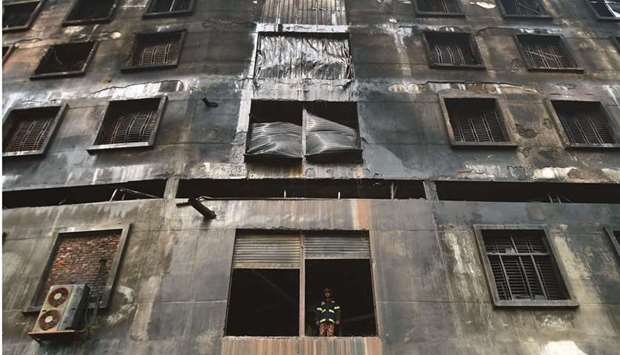The owner of a food-processing factory in Bangladesh was arrested for murder yesterday over a fire that killed 52 people who were trapped inside the building, police said.
The six-storey factory outside the capital Dhaka was built without permission, according to police who said it had no emergency fire exits and lacked adequate safety measures.
Some workers managed to reach the roof and were rescued after the building caught ablaze on Thursday, but many could not escape, said police, adding that one of the doors leading from the stairs to the roof was locked.
District police chief Jayedul Alam said the entrance had been padlocked along with multiple other breaches of safety regulations.
“It was a deliberate murder,” he told AFP.
Emergency services found 48 bodies on the third floor of the Hashem Food and Beverage factory in Rupganj, an industrial town outside Dhaka.
The arrested man, Abul Hashem, owned private firm Hashem Food and Beverage, a unit of Sajeeb Group, which he also owned, according to police.
Hashem and Sajeeb did not respond to requests for comment.
Four of the factory owner’s sons and three company officials were also arrested over the fire at the factory, where chemicals and inflammable materials were stored.
Before his arrest, owner Abul Hashem told the Daily Star newspaper that the fire “may have been a result of workers’ carelessness” and a discarded cigarette could have sparked the carnage.
Firefighters were unable to put out the blaze until late on Friday, and the cause of the fire is still being investigated.
Police chief Alam said a separate investigation had been launched into allegations that the factory employed children as young as 11.
Monnujan Sufian, state minister for labour, confirmed that inquiries had begun into the use of child workers at the factory.
Laizu Begum, who spent hours waiting outside the factory for news of her 11-year-old nephew, said he had been working on the third floor.
“We heard the door of the floor where my nephew worked was padlocked. Then we realised after seeing how big the fire was that he is probably dead,” said the woman.
Outside the burnt shell of the factory and at the hospital morgue, AFP spoke to 30 survivors and relatives of the dead, who said child workers at the factory were paid just 20 taka (24 US cents) per hour.
Bilal Hossain, whose 14-year-old daughter was among the missing, went to the Dhaka Medical College Hospital morgue with a photo, begging police and doctors to find her remains.
“I sent my baby girl to die,” said Hossain, who added that the company owed the girl back wages. “How will I tell her mother?”
Chandu Mia held a photo of his 15-year-old daughter.
“I am not sure if she is alive,” he said, holding back tears.
State minister Sufian told AFP that she had spoken to two survivors aged 14.
“I went to the hospital and I asked them how old they are. The youngest were 14,” she said.
Sufian said some children of 14 were allowed to work in non-hazardous jobs, but that the Hashem factory was considered hazardous.
“If child labour is proved, we will take action against the owner and the inspectors,” she said.
Fires kill hundreds of people a year in Bangladesh, where some buildings have poor safety standards, according to safety experts and rights groups.
Government officials had promised better safety standards after the 2013 collapse of the Rana Plaza garment factory building in Dhaka that killed more than 1,000 workers and injured hundreds.
However, there has been a series of fires and other disasters since then.
At least 70 people died in February 2019 when fire tore through Dhaka apartments where chemicals were illegally stored.
Unions have said the latest disaster has again showed how labour and factory laws are poorly enforced.
The International Labour Organisation (ILO), a UN agency, said the blaze “illustrates the urgent need” for Bangladesh authorities and building owners to ensure that factories meet national safety standards.
The ILO said the government must “apply renewed vigour in addressing the safety deficits in workplaces across the country”.

A firefighter stands at a first floor window of the burnt factory in Rupganj after putting out the remnants of a fire yesterday.
